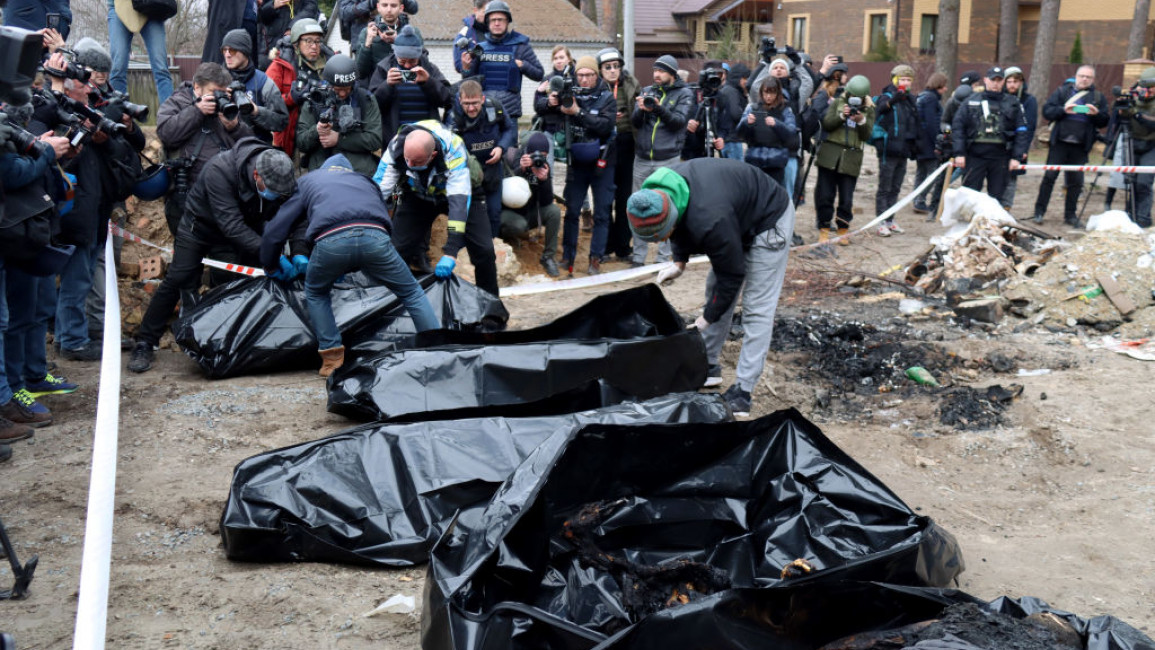
Bucha, Ukraine: A deliberate massacre ordered by Putin?
Women gunned down as they fled their homes under the threat of Russian airstrikes. Men, their hands tied behind their backs, with gunshot wounds to the back of their slumped heads. Children, as young as 14, were among the dead, their young bodies savaged and mutilated.
This is only some of the most strikingly distressing imagery of what is now known as the Bucha massacre, wherein at least 320 people were executed by Russian forces during their occupation of the city.
Like many other towns and cities in Ukraine, Bucha had faced the “typical” brutal atrocities that Russian forces have used as tactics in their invasion of Ukraine. Schools and hospitals have been mercilessly attacked, while much of the targeted cities, including 90% of Mariupol, have been destroyed.
But, in Bucha, something was different. The violence that Russia has unleashed with aplomb, was revealed to be even more monstrous. The bodies of the unarmed civilian victims littered the streets, and more were found in mass graves.
''Perhaps there is a ‘tactical logic’ to the motives of Russia in perpetrating the massacre in Bucha. The fact that Russia so inconspicuously left bodies on the streets of the city was possibly a way of sending a message to the resistance in the Donbas (East Ukraine).''
This was not, as some might assume, a show of strength by Russia, but rather an an act of calculated vicious defiance. Bucha, which is a small city in the Kyiv Oblast, had originally been conquered by the Russians as a stepping stone to Kyiv itself. But as the Russian forces faced ever more fierce resistance from the Ukrainians, Putin was forced into a humiliating retreat.
If Russia couldn’t beat the Ukrainian resistance, it would turn on civilians. The massacre was perpetrated as Russian forces made their retreat from Bucha, which was discovered only after they had left.
Though it might be tempting to look for a ‘tactical’ reason for such horrors, it seems clear that the purpose is to punish Ukrainians for their defiance, for their resistance and for their unbending will to remain free.
As the massacre has come to light, Russia has of course rushed to denial, both ‘officially’ through its various diplomats and spokespeople, as well as through its loyal propagandists in the ‘alternative media’ and on social media. This disinformation is what Russia has excelled at over the past decade or so, especially in Syria, where it attempted to obscure Assad’s worst crimes by relying on its own provably absurd collection of useful idiots, fascists and alt-left mouthpieces in the West who would disseminate it.
However, along with Ukraine exposing the deficiencies in Russian military power, Putin’s regime is also losing its efficiency in creating these ‘alternate realities’, where absurd conspiracy theories are used to justify war crimes and genocide.
And though the massacre in Bucha ought to also be seen through the prism of Russian limitations, this is scant consolation for Ukrainians.
According to Ukrainian presidential spokesman Sergii Nykyforov, there is growing concern that similar atrocities could have been carried out in other areas of Russian retreat. Given the use of mass graves in Bucha, and the scale of refugees and missing people in Ukraine, as well as continuing bombing by Russian forces, it could take a long time to discover such horrors.
But there’s also another component to this. Perhaps there is a ‘tactical logic’ to the motives of Russia in perpetrating the massacre in Bucha. The fact that Russia so inconspicuously left bodies on the streets of the city was possibly a way of sending a message to the resistance in the Donbas (East Ukraine). Though much of the Donbas is already occupied by Russia and its separatist proxies, its new primary goal, since its defeat in attempting to capture Kyiv, has been to conquer the remaining parts of the region that remain part of Ukraine.
Attacking and besieging the remaining free parts of Donbas have been characteristically brutal, but Bucha adds a new dimension to this violence, namely that Russia will punish Ukrainians into subservience.
''There is no deterrent against Russian mass murder through the current sanctions, especially if they are restricted by Germany’s inability to go without Russian gas.''
The free towns and cities of the Donbas see Russia attacking not military targets, but schools, hospitals and civilian neighbourhoods. Bucha proves that Russia’s war is one that wages against what it means to be Ukrainian, and sovereign.
Russia deployed similar terror tactics during the war in Chechnya, perpetrating acts of murderous ‘cleansing’, most notably the Samashki massacre. The point wasn’t just to achieve military victory over Chechen rebels, but to terrorise them into accepting Russian hegemony.
The fear among Ukrainians is that Russia intends to carry out similar atrocities against Ukrainians fighting for their freedom and identity in the Donbas – or that their will to defend their land is broken by the threat of such atrocities.
Even more chillingly, the point could be that Russia intends to commit mass cleansing of Ukrainians in areas of the Donbas that it wishes to conquer.
What can be done? The most obvious point is that Ukrainians should receive as much military aid as possible without any limits to defend all of Ukraine, including the Donbas. This would also stop Putin using fig leaf diplomacy to commit land grabs in Ukraine that will simply kick the can down the road.
There is no deterrent against Russian mass murder through the current sanctions, especially if they are restricted by Germany’s inability to go without Russian gas.
Bucha presents the world with a problem: if Russia is allowed to get away with war crimes in Ukraine, what will stop it escalating and expanding them? It was the case in Syria, after all.
Bucha ought not to be seen as an aberration on the part of Russia, but rather a natural consequence of Putin’s ideology. One fears there will be many more Buchas to come.
Sam Hamad is a writer and History PhD candidate at the University of Glasgow focusing on totalitarian ideologies.
Join the conversation @The_NewArab.
Have questions or comments? Email us at: editorial-english@alaraby.co.uk.
Opinions expressed in this article remain those of the author and do not necessarily represent those of The New Arab, its editorial board or staff.


![President Pezeshkian has denounced Israel's attacks on Lebanon [Getty]](/sites/default/files/styles/image_684x385/public/2173482924.jpeg?h=a5f2f23a&itok=q3evVtko)



 Follow the Middle East's top stories in English at The New Arab on Google News
Follow the Middle East's top stories in English at The New Arab on Google News


